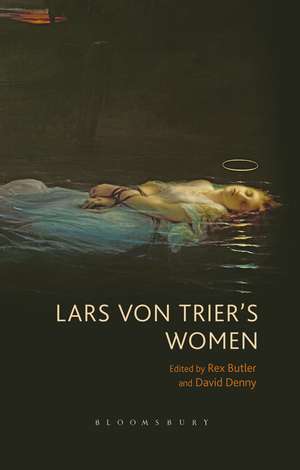Lars von Trier's Women
Editat de Dr Rex Butler, David Dennyen Limba Engleză Paperback – 30 apr 2018
| Toate formatele și edițiile | Preț | Express |
|---|---|---|
| Paperback (1) | 237.84 lei 43-57 zile | |
| Bloomsbury Publishing – 30 apr 2018 | 237.84 lei 43-57 zile | |
| Hardback (1) | 832.26 lei 43-57 zile | |
| Bloomsbury Publishing – 16 noi 2016 | 832.26 lei 43-57 zile |
Preț: 237.84 lei
Preț vechi: 272.82 lei
-13% Nou
45.53€ • 49.47$ • 38.27£
Carte tipărită la comandă
Livrare economică 21 aprilie-05 mai
Specificații
ISBN-10: 1501342096
Pagini: 224
Dimensiuni: 152 x 229 x 19 mm
Greutate: 0.37 kg
Ediția:NIPPOD
Editura: Bloomsbury Publishing
Colecția Bloomsbury Academic
Locul publicării:New York, United States
Caracteristici
Notă biografică
Rex Butler is Professor of Art History at the University of Queensland, Australia. He is the author of Jean Baudrillard: The Defence of the Real (1999), Slavoj Zizek: Live Theory (2005), Borges' Short Stories (2010), The Zizek Dictionary (2014), and Deleuze and Guattari's What is Philosophy? (2015). He has written for Film-Philosophy, contributed essays to a number of collections on cinema, and edited two volumes of Zizek's writings (Interrogating the Real, 2005; The Universal Exception, 2006).David Denny is Associate Professor and current Chair of the Department of Culture and Media at Marylhurst University, USA. He teaches and does research on the intersection of critical theory, psychoanalysis, film and politics. He has published "Signifying Grace: On Dogville in The International Journal of Zizek Studies, "The Politics of Enjoyment: On The Hurt Locker" in Theory and Event, and "Melancholia: An Alternative to the End of the World" in the collected volume Cinematic Cuts (2016).
Cuprins
AcknowledgmentsIntroduction: The Feminine Act and the Question of Woman in Lars von Trier's Films - Rex Butler (Monash University, Australia) and David Denny (Marylhurst University, USA)Chapter 1: Performing the Feminine - Linda Badley (Middle Tennessee State University, USA)Chapter 2: Feminimity: Between Goodness and Act - Slavoj Zizek (University of Ljubljana, Yugoslavia)Chapter 3: Listening to Dancer in the Dark: Singing as Recalling the World - Ulrike Hanstein (Bauhaus-Universität Weimar, Germany)Chapter 4: A Woman's Smile - Rex Butler (Monash University, Australia)Chapter 5: Female Fight Club: Lars von Trier's Women and the Paradox of Being - Sheila Kunkle (Metropolitan State University, USA)Chapter 6: Cruelty and the Real: The female figure in Orchidégartneren (1977), Menthe - la bienheureuse (1979) and Befrielsesbilleder (1982)- Angelos Koutsourakis (University Leeds, UK)Chapter 7: What is the Gift of Grace? On Dogville - Lorenzo Chiesa (European University at St. Petersburg, Russia)Chapter 8: Manderlay: The Gift, Grace's Desire and the Collapse of Ideology - Ahmed Elbeshlawy (University of Hong Kong)Chapter 9: Violent Affects: Nature and the Feminine in Antichrist - Magdalena Zolkos (Australian Catholic University)Chapter 10: A Postmodern Family Romance: Antichrist - David Denny (Marylhurst University, USA)Chapter 11: Not Melancholic Enough - Todd McGowan (University of Vermont, USA)Chapter 12: How to Face Nothing: Melancholia and the Feminine - Jennifer Friedlander (Pomona College, USA)Chapter 13: Lars von Trier's Fantasy of Femininity in Nymphomaniac - Hilary Neroni (University of Vermont, USA)Chapter 14: Mea Maxima Vulva: Appreciation and Aesthetics of Chance in Nymphomaniac - Tarja Laine (University of Amsterdam, The Netherlands)Index
Recenzii
Lars von Trier's Women is much more than a collection of essays - it is a very powerful critical project going right to the heart of the oeuvre of one of the greatest and most intriguing contemporary directors. This heart concerns not simply "von Trier's women", but with them and beyond them the question and the dimension of a genuine act at work in von Trier's art. The singularity of von Trier's opus works as an extremely productive trigger of the essays written by some of the most significant authors in contemporary theory. Lars von Trier's Women is a magnificent cocktail of cinema, philosophy, psychoanalysis and film theory.
Descriere
The Danish director Lars von Trier is undoubtedly one of the world's most important and controversial filmmakers, and arguably so because of the depiction of women in his films. He has been criticized for subjecting his female characters to unacceptable levels of violence or reducing them to masochistic self-abnegation, as with Bess in Breaking the Waves, 'She' in Antichrist and Joe in Nymphomaniac. At other times, it is the women in his films who are dominant or break out in violence, as in his adaptation of Euripides' Medea, the conclusion of Dogville and perhaps throughout Nymphomaniac. Lars von Trier's Women confronts these dichotomies head on. Editors Rex Butler and David Denny do not take a position either for or against von Trier, but rather consider how both attitudes fall short of the real difficulty of his films, which may simply not conform to any kind of feminist or indeed anti-feminist politics as they are currently configured. Using Lacanian psychoanalysis and acknowledging the work of prior scholars on the films, Lars von Trier's Women reveals hidden resources for a renewed 'feminist' politics and social practice.










